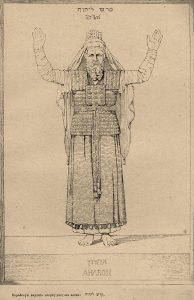Yesterday we talked about the fascinating structure of the priestly blessing and today we will discuss the Hebrew meaning of the words it contains. As mentioned in the previous post, the priestly blessing has three parts:
The LORD bless you and keep you. (1) The LORD make his face to shine upon you and be gracious to you. (2) The LORD lift up his countenance upon you and give you peace. (3)
And in the original Hebrew:
יְבָרֶכְךָ יְהוָה, וְיִשְׁמְרֶךָ (1
2) יָאֵר יְהוָה פָּנָיו אֵלֶיךָ, וִיחֻנֶּךָּ
3) יִשָּׂא יְהוָה פָּנָיו אֵלֶיךָ, וְיָשֵׂם לְךָ שָׁלוֹם
The opening statement is very general and speaks about God’s blessing. The Hebrew word ‘Yeesh’merecha’ (ישמרך) which was translated to English as ‘keep you’ has more than just one meaning in Hebrew, such as: ‘guard’, ‘protect’ and ‘save.’

The second and the last parts are defined by the same structure and divided into two parts – the first is the appearance of ‘God’s face’ (a Hebrew idiom that will be discuss next) and the second is the extension of the blessing. ‘The LORD make his face to shine upon you’ which appears in the original Hebrew as ‘Ya’er Adonai Pa’nav El’echa’ {יאר אדוני פניו אליך ויחנך} is a Hebrew idiom that means that a person will benefit from God’s goodness, as can be seen in the following example from the Book of Daniel:
“Now therefore, O our God, listen to the prayer of your servant and to his pleas for mercy, and for your own sake, O Lord, make your face to shine upon your sanctuary, which is desolate.” (Daniel 9:17)
Interestingly, this idiom has an ‘opposite equivalent’ which can be found in the following example:
“And I will surely HIDE my FACE in that day because of all the evil that they have done, because they have turned to other gods.” (Deuteronomy 31:18)
‘The LORD lift up his countenance upon you’ which appears in the last part of the priestly blessing, is very similar to the Hebrew idiom we just discussed. In the original Hebrew, the word ‘countenance’ appears as ‘Panim’ (פנים) – meaning ‘face’. This part actually completes the last two parts and ends with ‘give you peace’ – which appears in the original Hebrew as ‘Va-Yasem Le’cha Shalom’. {וישם לך שלום}
This Hebrew phrase can be found in the Hebrew Bible only ONCE more:
“He makes peace in your borders; he fills you with the finest of the wheat.” (Psalm 147:14)
This phrase is very popular among Jewish liturgical texts and can be found many times as the ending of Jewish prayers.
